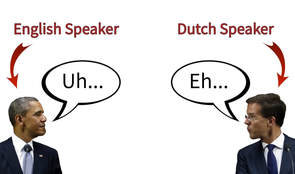|
Every media training I've ever been to advocated doing away with um and uh. However, this principle is based on what is best for media personalities, not crisis communicators. If you read the advice post, you won't be surprised to know I care little about ums and uhs. They are a natural part of speech and can actually lend credibility in a time of crisis. When you use those fillers it is a sign to everyone listening that you are thinking out loud. You are verbalizing your thoughts.  Linguists have found that about 1 in every 60 words spoken is an um or an uh with um overwhelmingly used by females and uh primarily by males. Curiously, that pattern holds across all Germanic-influenced languages, though some countries use a variant and um is increasing in usage among younger generations. Because they are so prevalent, using these fillers at about the regular rate does not diminish your presence or message if you are a crisis communicator. People will know there's a lot going on and the fillers validate that you are a human and speak like one. Now, if you drop one every few syllables, you have some work to do as frequent use could detract. The same goes for fillers like like, you know, and other "Valley-speak." However, for most of us, there are several reasons we shouldn't concentrate on um and uh when delivering critical information: 1. If you have lots of info to provide, worrying about inconsequential things like um and uh will increase the chance you lose your train of thought and don't communicate as effectively. 2. If you are a smooth talker, you can appear too polished for the situation which will lead to a loss of credibility as people will see you as a trained spokesperson instead of a responder who just happens to have the job of providing information. 3. The fillers act as breaths for your brain so you can gather and phrase the next thought. It's an automatic slowing-down process and we all know what happens when we get to talking too fast. Everyone with detailed, complex information uses some kind of filler pause. For instance, Bill Clinton trained himself not to say um or uh, but he did make a fist and bite his lip instead. The pause is natural. 4. They are signals that you are not done speaking. This works in smaller conversations as a traffic sign so people don't start in before you are finished, but it can also work in interviews or briefings. The last thing you want when you're trying to work a thought out quickly is for a reporter to be yelling another question at you. Now, I do make an effort to not start off the first sentence with an uh (I'm a guy). After that, if I'm in a stressful environment, I don't worry about it. Naturally. _____ JIM Copyright © Jim Whittington, 2018, All rights reserved. Academic use approved with notification and attribution.
1 Comment
6/5/2018 08:05:02
As a linguist, let me first thank you for the shout out to the field of study. I will forever fight the intrusion of "like" into modern-day speech but I do agree with your advice. Though I may cringe when hearing filler in an interview, linguistics generally takes a descriptive view, rather than prescriptive. That is to say, the job is to describe language but not to tell people how to say something "correctly". The most important factor here is whether the listener understood what the speaker said. If you, as a PIO get your facts out to the public and they understood what you said, you've had a successful interview. Whether the public understands and actually uses the information is a separate but related topic.
Reply
Leave a Reply. |
Occasional thoughts on incident response, crisis communications, wildland fire, and other topics.
Docendo disco, scribendo cogito. Blog DOB: 4/26/2018Copyright © Jim Whittington, 2019. Archives
August 2019
Categories
All
|
 RSS Feed
RSS Feed